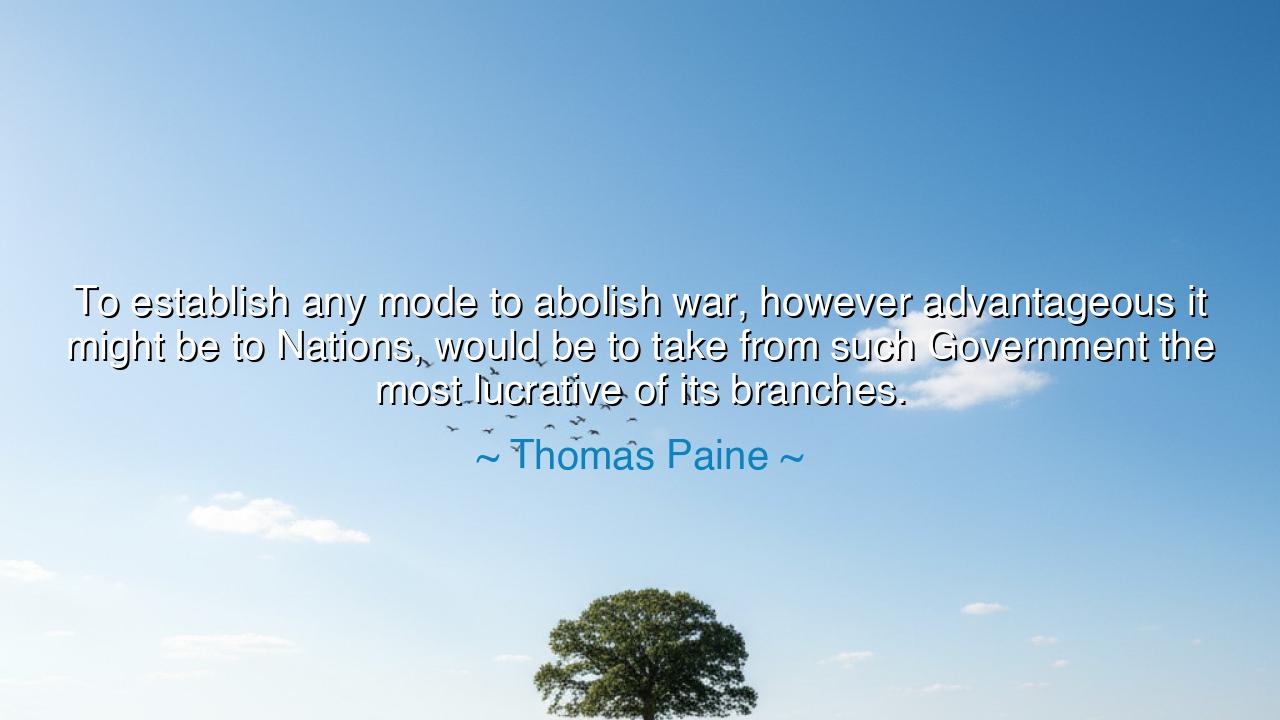
To establish any mode to abolish war, however advantageous it
To establish any mode to abolish war, however advantageous it might be to Nations, would be to take from such Government the most lucrative of its branches.






The voice of Thomas Paine, like a flame that never dies, speaks with clarity and courage through the centuries: “To establish any mode to abolish war, however advantageous it might be to Nations, would be to take from such Government the most lucrative of its branches.” In these searing words lies both accusation and revelation. Paine — the fiery revolutionary, the author of Common Sense and The Rights of Man — strips away the mask of patriotism to reveal the darker face of power: the profit of war. He tells us that many governments, though claiming to serve peace, thrive upon the economy of conflict, feeding upon fear, ambition, and the blood of their own people. To abolish war, then, would not merely save humanity — it would cut off the richest artery of government gain.
To grasp the meaning of this quote, we must remember that Paine lived in an age when kings waged wars not for liberty, but for empire. Monarchies were measured by the reach of their armies, the spoils of conquest, and the taxes that warfare justified. Paine, ever the champion of reason and justice, saw that war was often not the defense of the people, but the enterprise of rulers. It was a business — cruel, wasteful, and endlessly profitable for those who managed it. Governments borrowed, taxed, and conscripted in the name of national pride, while the common man paid the price in life and labor. Thus Paine declared: if peace were made permanent, the power and profit of government would wither, for war was its most convenient means of control.
The origin of these words can be found in the post-revolutionary period of Paine’s life, when he had seen both the glory and the corruption of power. Having fought with his pen for American independence, he watched with sorrow as nations that once fought for freedom fell into the same traps of greed and domination. In The Rights of Man, he condemned the European monarchs who disguised conquest as “national interest.” He understood that war allows governments to expand taxes, restrict liberties, and unite people through fear rather than reason. It was not simply a political tool — it was a machine of manipulation, where the cries of patriotism drowned the cries of conscience.
History offers countless confirmations of Paine’s wisdom. Consider the Crimean War of the 19th century, fought at immense cost for little purpose beyond the vanity of empires. Or the military-industrial complex of the modern era, which President Eisenhower — himself a soldier — would later warn against. He foresaw what Paine had already declared: that when war becomes an industry, peace becomes the enemy of profit. In every age, the same truth repeats — that the banners of nations may change, but the hunger of power remains. The machinery of war, once built, demands to be fed, not for defense, but for gain.
Paine’s quote thus challenges us to ask a question few dare to face: do our governments truly desire peace, or only the appearance of it? For if peace were ever truly achieved — if mankind learned to settle disputes by justice and understanding — then the rulers of the world would lose their greatest justification for control. Standing armies would shrink. Taxes would fall. Fear would fade. And with it, the manipulation of nations through slogans and spectacles. The truth Paine reveals is harsh but necessary: peace does not serve those who profit from power; it serves only those who value liberty and human life.
The lesson we must draw from this is not despair, but vigilance. The love of peace must never rest in the hands of governments alone, for they are too easily tempted by the wealth and authority that war brings. It must live in the hearts of the people — in the will of citizens who refuse to be deceived by patriotic spectacle. Each man and woman must learn to question not the soldiers who fight, but the motives of those who send them. True patriotism, Paine would say, is not the blind loyalty that shouts for victory, but the moral courage that stands for truth, even when it challenges one’s own nation.
And so, my child, remember this: every war begins not with weapons, but with words — with the slow corruption of truth. Guard your heart from the rhetoric of power. Support peace not as a dream, but as a discipline — in your speech, your vote, your dealings with others. Stand firm against the seduction of hatred and the illusion of glory. For as long as humanity allows war to enrich the few at the cost of the many, we remain slaves in a gilded cage. But if we awaken — if we keep alive the spirit of reason, compassion, and resistance — then Paine’s vision may yet be fulfilled: a world where the business of government is not war, but the preservation of peace and the dignity of mankind.






AAdministratorAdministrator
Welcome, honored guests. Please leave a comment, we will respond soon